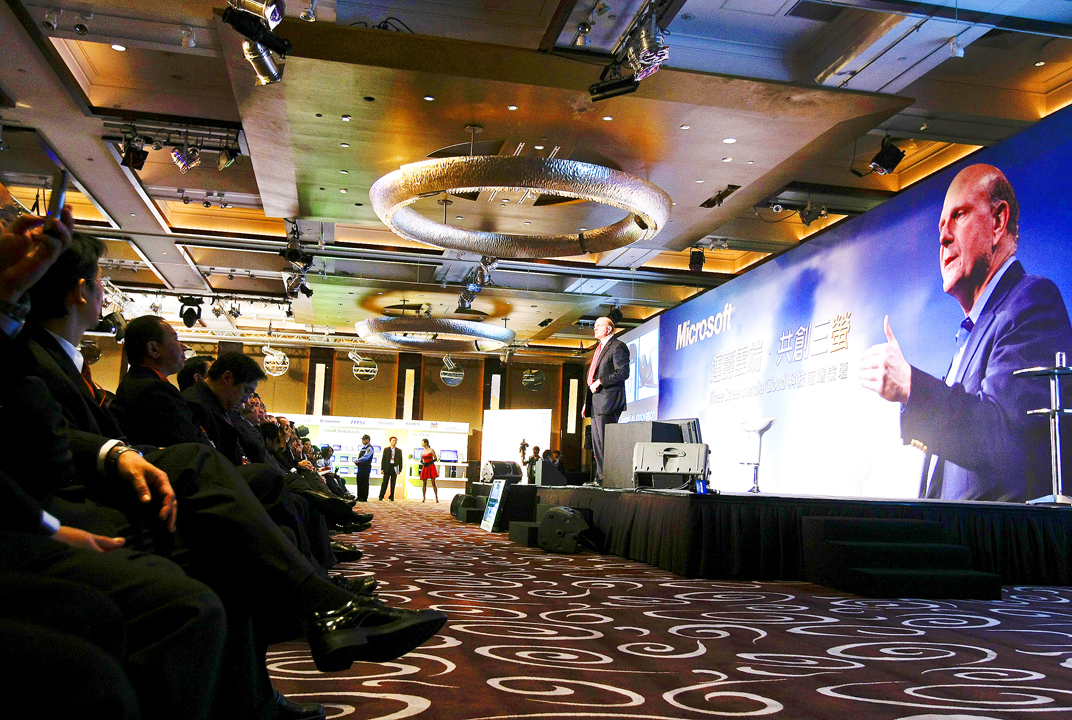Microsoft Corp signed memorandums of understanding with the Ministry of Economic Affairs (MOEA) and Chunghwa Telecom Co (中華電信) yesterday to facilitate cloud computing in Taiwan.
The company and the ministry will open a Software and Services Excellence Center by the end of the year to help Taiwanese electronics makers develop devices and services for cloud computing — an emerging technology which enables users to access data saved in remote servers through telephones or computers.
“Cloud computing allows enterprises to lower costs and upfront capital. It increases their agility,” Microsoft CEO Steve Ballmer said on the eve of the 20th anniversary of his company’s local operations.

PHOTO: CHRIS TZOU, BLOOMBERG
The company expects to engage more deeply and actively with the local technology community through the center, he said.
Microsoft’s pact with Chunghwa Telecom will allow the country’s largest telecom operator to employ Microsoft’s cloud computing platform in offering related services to small and medium-sized businesses.
Microsoft will also seek partnerships on cloud computing with financial institutions and hardware companies, said Simon Leung (梁念堅), chairman and CEO of Microsoft’s Greater China region.
Ballmer hosted a Microsoft forum yesterday morning on the topic of “Three Screens and a Cloud,” a concept that envisions connecting PCs, handsets and TVs to the Internet and offers tremendous opportunities for cloud computing business. In the afternoon, he attended press conferences announcing tie-ups with Chunghwa Telecom and HTC Corp (宏達電).
Ballmer, who arrived on Tuesday and left yesterday, also made time to meet representatives from his company’s local tech partners, including Acer Inc (宏碁), Asustek Computer Inc (華碩), Hon Hai Precision Industry Co (鴻海精密), Kinpo Group (金仁寶集團) and AU Optronics Corp (友達光電).
In a brief question-and-answer session with media, Ballmer appeared unconcerned that some of these partners are also offering products using Google Inc and Apple Inc’s solutions.
“We actually make products that are popular, that’s the key for ongoing partnership,” Ballmer said. “The partnerships thrive while we make money together.”
He also said the launch of the new Windows 7 operating system late last month has created great consumer momentum.
“Overall response to Windows 7 has been positive. It is simpler, faster, more responsive,” he said.
Also See: Windows 7’s hidden gems

IN THE AIR: While most companies said they were committed to North American operations, some added that production and costs would depend on the outcome of a US trade probe Leading local contract electronics makers Wistron Corp (緯創), Quanta Computer Inc (廣達), Inventec Corp (英業達) and Compal Electronics Inc (仁寶) are to maintain their North American expansion plans, despite Washington’s 20 percent tariff on Taiwanese goods. Wistron said it has long maintained a presence in the US, while distributing production across Taiwan, North America, Southeast Asia and Europe. The company is in talks with customers to align capacity with their site preferences, a company official told the Taipei Times by telephone on Friday. The company is still in talks with clients over who would bear the tariff costs, with the outcome pending further

WEAKER ACTIVITY: The sharpest deterioration was seen in the electronics and optical components sector, with the production index falling 13.2 points to 44.5 Taiwan’s manufacturing sector last month contracted for a second consecutive month, with the purchasing managers’ index (PMI) slipping to 48, reflecting ongoing caution over trade uncertainties, the Chung-Hua Institution for Economic Research (CIER, 中華經濟研究院) said yesterday. The decline reflects growing caution among companies amid uncertainty surrounding US tariffs, semiconductor duties and automotive import levies, and it is also likely linked to fading front-loading activity, CIER president Lien Hsien-ming (連賢明) said. “Some clients have started shifting orders to Southeast Asian countries where tariff regimes are already clear,” Lien told a news conference. Firms across the supply chain are also lowering stock levels to mitigate

NEGOTIATIONS: Semiconductors play an outsized role in Taiwan’s industrial and economic development and are a major driver of the Taiwan-US trade imbalance With US President Donald Trump threatening to impose tariffs on semiconductors, Taiwan is expected to face a significant challenge, as information and communications technology (ICT) products account for more than 70 percent of its exports to the US, Chung-Hua Institution for Economic Research (CIER, 中華經濟研究院) president Lien Hsien-ming (連賢明) said on Friday. Compared with other countries, semiconductors play a disproportionately large role in Taiwan’s industrial and economic development, Lien said. As the sixth-largest contributor to the US trade deficit, Taiwan recorded a US$73.9 billion trade surplus with the US last year — up from US$47.8 billion in 2023 — driven by strong

RESHAPING COMMERCE: Major industrialized economies accepted 15 percent duties on their products, while charges on items from Mexico, Canada and China are even bigger US President Donald Trump has unveiled a slew of new tariffs that boosted the average US rate on goods from across the world, forging ahead with his turbulent effort to reshape international commerce. The baseline rates for many trading partners remain unchanged at 10 percent from the duties Trump imposed in April, easing the worst fears of investors after the president had previously said they could double. Yet his move to raise tariffs on some Canadian goods to 35 percent threatens to inject fresh tensions into an already strained relationship, while nations such as Switzerland and New Zealand also saw increased